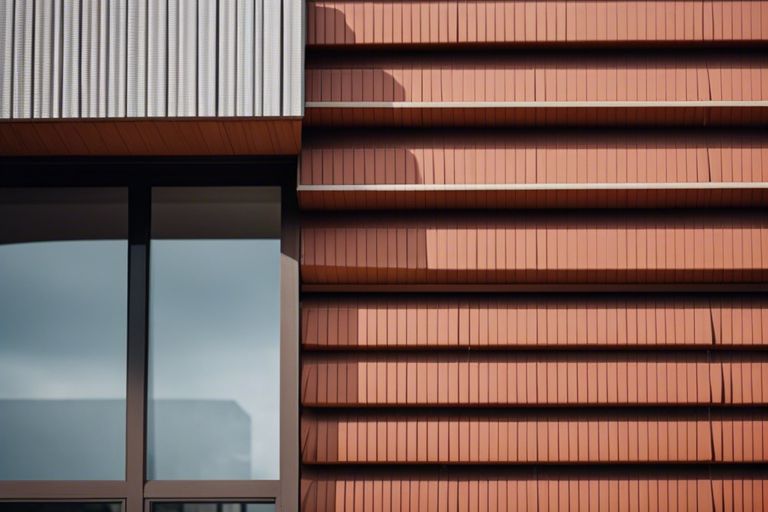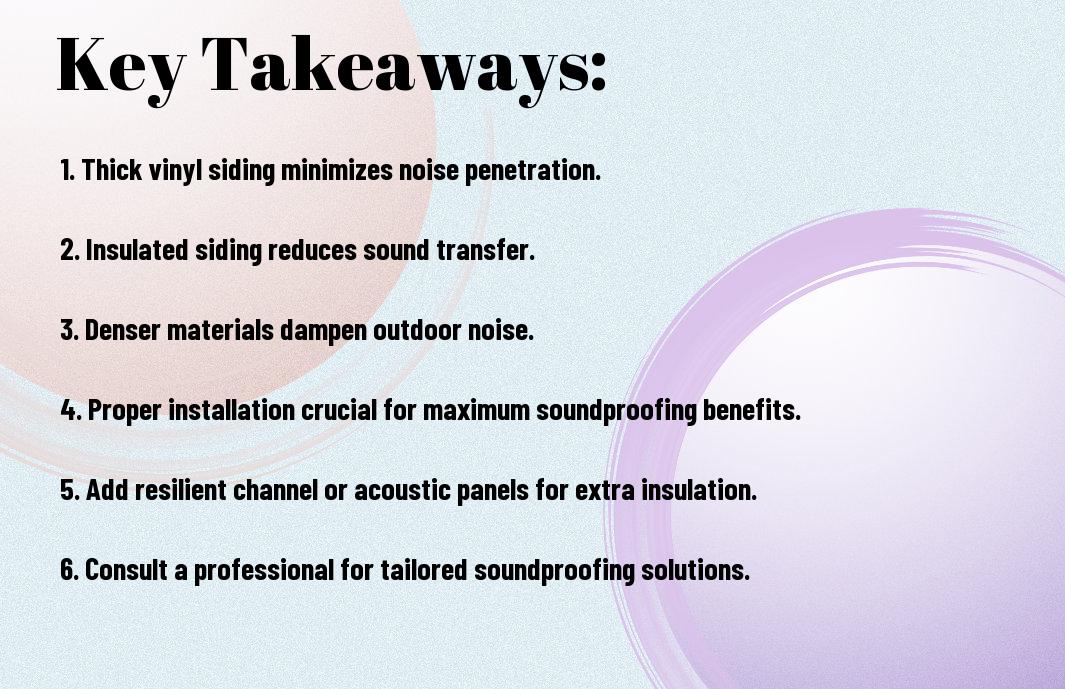
Excessive noise pollution can lead to a myriad of health issues, from sleep disturbance to increased stress levels. One effective way to combat this issue is by investing in quality siding for your home. But does adding siding really help with soundproofing? In this blog post, we will delve into the effectiveness of siding as a soundproofing solution and explore its benefits and limitations.
Key Takeaways:
- Quality of Material Matters: When selecting siding for soundproofing, opt for high-quality materials like insulated vinyl or fiber cement which can effectively help in reducing noise transmission.
- Additional Soundproofing Measures: Siding alone might not provide complete soundproofing. Consider combining it with other methods like double glazing windows, weatherstripping, and insulation for better results.
- Professional Installation is Key: Proper installation is crucial for the effectiveness of soundproof siding. Ensure that the siding is installed correctly by professionals to maximize its sound-dampening properties.

The Basics of Soundproofing
Obviously, when it comes to soundproofing a room, there are certain key concepts and terminology that are important to understand in order to effectively reduce noise transfer. By grasping the basics of soundproofing, you can make informed decisions about the materials and techniques you use to create a quieter environment.
Key Concepts and Terminology
Soundproofing is the process of minimizing sound pressure with respect to a specified sound source and receptor. Soundproofing can involve adding mass or damping materials to reduce the sound transmission through walls, floors, ceilings, and doors. Understanding terms such as STC (Sound Transmission Class), NRC (Noise Reduction Coefficient), and decibels is crucial for assessing the effectiveness of different soundproofing measures.
How Soundproofing Works
On the surface, soundproofing may seem like a simple concept, but the science behind it is more complex. Soundproofing works by both blocking and absorbing sound waves, preventing them from traveling from one space to another. Blocking sound involves using materials that are dense and heavy, while absorbing sound utilizes materials that convert sound energy into heat.
By combining these two approaches, soundproofing is able to significantly reduce the transmission of noise, creating a more peaceful and quiet environment. It is important to note that proper installation and sealing of soundproofing materials are essential to achieve optimal results in reducing noise transfer.
Types of Siding Materials
Despite the popularity of soundproofing, many homeowners are still unsure about which siding materials are the most effective for reducing noise. In this chapter, we’ll explore the various types of siding materials available and their soundproofing capabilities.
| Traditional Siding Materials | New Age Siding Materials |
| Brick | Vinyl |
| Wood | Fiber Cement |
| Stucco | Metal |
| Stone | Composite |
| Aluminum | PVC |
Traditional Siding Materials
Materials such as brick, wood, stucco, stone, and aluminum have been used for decades in home construction. While these materials offer durability and aesthetic appeal, they may not provide the best soundproofing capabilities. Sound can easily pass through these materials, especially at lower frequencies.
New Age Siding Materials
Siding materials like vinyl, fiber cement, metal, composite, and PVC have gained popularity in recent years due to their improved insulation properties and enhanced soundproofing capabilities. These materials are specifically designed to reduce noise transmission and offer better acoustic performance compared to traditional siding options.
To effectively soundproof your home, consider using New Age Siding Materials such as vinyl, fiber cement, or composite. These materials not only provide increased insulation against noise but also offer durability and low maintenance benefits. When choosing siding materials for soundproofing, it is important to prioritize quality and performance over cost to achieve the best results.
- Recognizing the importance of selecting the right siding materials can make a significant difference in the overall soundproofing effectiveness of your home.
Analyzing Siding Materials for Soundproofing
Material Density and Sound Transmission
Your choice of siding material can significantly impact the soundproofing capabilities of your home. Sound transmission occurs when sound waves travel through a material. Materials with higher density are more effective at blocking sound transmission, as they absorb and dampen the vibrations caused by noise. When considering siding options for soundproofing, it is essential to take the material density into account.
Materials like fiber cement siding and brick have high-density properties, making them excellent choices for soundproofing. Conversely, materials such as vinyl siding and wood siding have lower densities and may not provide the same level of sound insulation.
Surface Texture and Sound Absorption
Sound absorption is another crucial factor to consider when selecting siding for soundproofing. The surface texture of the siding can affect how sound waves are reflected or absorbed. Rough surfaces can scatter sound waves, reducing their intensity, while smooth surfaces may reflect sound waves more directly.
To optimize sound absorption, consider textured materials like stucco or composite siding. These materials have irregular surfaces that disrupt and absorb sound waves, improving the overall soundproofing of your home.
Installation Techniques and Soundproofing
For optimal soundproofing results, the installation process of siding plays a crucial role. Proper techniques can significantly enhance the soundproofing capabilities of the siding material used. Understanding the right way to install siding for soundproofing is essential in creating a quieter and more peaceful indoor environment.
Proper Installation for Enhanced Soundproofing
To achieve the best soundproofing results, it is important to ensure that the siding material is installed correctly. This includes making sure that there are no gaps or cracks between the siding panels where sound can easily penetrate. Additionally, using high-quality insulation materials behind the siding can further improve soundproofing capabilities by absorbing noise vibrations effectively.
Additional Soundproofing Measures During Installation
On top of proper installation techniques, there are additional soundproofing measures that can be taken during the siding installation process to enhance soundproofing. These may include using soundproofing barriers or membranes between the siding and the wall structure to block sound transmission. Sealing any gaps or seams thoroughly can also prevent sound from leaking through and disrupting the indoor environment.
Techniques such as using double-layered siding or adding mass-loaded vinyl layers can also be effective in reducing sound transmission through the walls. By incorporating these additional soundproofing measures during the installation process, homeowners can create a more peaceful and noise-free living space.
Comparative Studies on Siding and Soundproofing
Keep informed decisions on siding upgrades for your home by understanding how it can contribute to soundproofing. Numerous studies have examined the effectiveness of different siding materials in reducing noise transmission. Here’s a breakdown of some comparative studies:
| Siding Material | Soundproofing Rating |
| Vinyl | Low to Moderate |
| Fiber Cement | Moderate to High |
| Brick | High |
| Wood | Low to Moderate |
Case Studies Highlighting Effective Soundproofing Siding
Effective soundproofing siding can make a significant difference in reducing noise pollution for homes and commercial buildings alike. Let’s take a look at some case studies showcasing the impact of soundproofing siding:
- Case Study 1: A residential building in a high-traffic area saw a 40% reduction in noise levels after installing fiber cement siding.
- Case Study 2: An office space with noisy neighbors experienced a 50% decrease in sound transmission with the use of brick siding.
- Case Study 3: A restaurant near a busy street achieved a 30% reduction in noise after upgrading to fiber cement siding.
Scientific Research on Siding Materials and Sound Insulation
Insulation plays a crucial role in soundproofing, and siding materials can significantly impact a building’s sound transmission. Scientific research has delved into the acoustic properties of various siding materials to understand their effectiveness in reducing noise pollution.
Sound transmission through walls can be minimized by choosing the right siding material with proper insulation. Studies have shown that materials like fiber cement and brick are more effective in soundproofing compared to vinyl or wood siding. The density and thickness of the siding material are key factors in blocking noise from entering or escaping a building.
Cost-benefit Analysis
Not all homeowners are convinced of the benefits of soundproofing siding, often questioning whether the cost justifies the results. In this cost-benefit analysis, we will delve into the expenses and advantages of installing soundproofing siding for your home.
Evaluating the Cost of Soundproofing Siding
To determine the cost of soundproofing siding, you need to consider several factors such as materials, labor, and the size of your property. While the initial investment may seem high, the long-term benefits often outweigh the costs. As soundproofing materials become more advanced, the prices are becoming more competitive, making it a viable option for homeowners looking to reduce noise pollution.
Long-term Benefits of Soundproofing Siding
The long-term benefits of soundproofing siding are significant. By reducing outside noise, homeowners can enjoy a quieter and more peaceful living environment. Additionally, soundproofing can increase the overall value of your home, making it a wise investment for resale purposes.
The installation of soundproofing siding can also improve energy efficiency, helping to lower heating and cooling costs over time. By creating a barrier against external noise, your HVAC system doesn’t have to work as hard to maintain a comfortable temperature inside your home, leading to savings on your energy bills.
Conclusion
Taking this into account, the use of siding for soundproofing can indeed help reduce noise transmission into your home. However, it is important to note that the effectiveness of soundproofing materials can vary based on factors such as the type of noise, the existing construction of the building, and the quality of installation. It is also recommended to combine siding with other soundproofing techniques for optimal results, such as sealing gaps and cracks, adding soundproof curtains, and using sound-absorbing materials.
FAQ
Q: What is soundproofing and how does siding help with it?
A: Soundproofing is the process of reducing or eliminating sound transmission from one area to another. Siding can help with soundproofing by adding an extra barrier between the interior of a building and the outside environment, blocking out noise and reducing sound transmission.
Q: Does siding really help with soundproofing?
A: Yes, siding can significantly improve soundproofing in a building. By choosing the right type of siding material and ensuring proper installation, you can effectively block out unwanted noise and create a quieter indoor environment.
Q: What are the best types of siding for soundproofing?
A: Some of the best types of siding for soundproofing include vinyl siding, fiber cement siding, and insulated siding. These materials offer good sound insulation properties and can help reduce noise transmission into your home or building.
Q: How can I maximize the soundproofing benefits of siding?
A: To maximize the soundproofing benefits of siding, make sure to properly seal and insulate the walls before installing the siding. This will help eliminate air gaps where sound can travel through and provide an extra layer of sound insulation.
Q: Are there any other soundproofing measures I can take in addition to siding?
A: Yes, in addition to siding, you can further improve soundproofing by installing double or triple-pane windows, adding soundproof curtains or blinds, using rugs or carpets to dampen sound, and sealing any gaps or cracks in walls and doors. Combining these measures can result in a significant reduction in noise levels inside your home or building.








